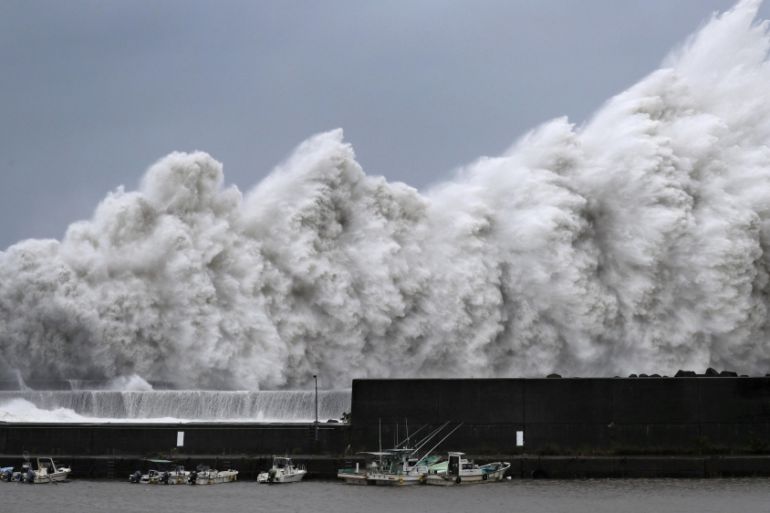Typhoon Jebi: Nine dead as strongest storm in 25 years hits Japan
Japan’s government issues evacuation advisories for more than a million people following the storm’s landfall on Shikoku

At least nine people have been reported dead and more than 300 injured as Typhoon Jebi – the strongest in 25 years – pummelled Japan.
The reports on Tuesday came after the Japanese government issued evacuation advisories for more than a million people following the storm’s landfall on Shikoku, the smallest main island.
Keep reading
list of 4 itemsAre seed-sowing drones the answer to global deforestation?
Rainfall set to help crews battling wildfire near Canada’s Fort McMurray
How India is racing against time to save the endangered red panda
Jebi – whose name means “swallow” in Korean – raked across the western part of the largest main island, Honshu, near the city of Kobe, several hours later, heading rapidly north.
NHK, the national public broadcaster, reported that one of the nine fatalities was a 71-year-old man, who died in western Shiga prefecture after being trapped under a warehouse that collapsed in the strong winds.
![Kansai International Airport is partly inundated after typhoon Jebi hit Osaka [AP]](/wp-content/uploads/2018/09/ea60ec9d325741a9944996ce8289e77c_18.jpeg)
Jebi is considered a category-3 typhoon, out of five, on the Saffir-Simpson scale. According to Kyodo News, it was the strongest typhoon to make landfall in Japan since 1993.
Tides in some areas were the highest since a typhoon in 1961, NHK said, with storm surge covering the runways at Kansai International Airport in Osaka.
NHK also reported that an estimated 3,000 passengers are stranded at the Kansai airport, as airline companies cancelled hundreds of flights. Several hundred airport workers were also stranded.
In Osaka, an operation to free the stranded crew of a fuel tanker was called off because of a ruptured gas pipe. Two people were reported rescued, while nine remain on board, according to NHK.
Evacuation advisories were issued as the wind and rain began picking up, the Fire and Disaster Management Agency said.
Wind gusts of up to 208km/h were recorded in one part of Shikoku, with forecasts as high as 216km/h.
The fast-moving storm quickly crossed the mainland, and by nightfall was heading out to sea from Ishikawa in central Japan.
According to the country’s meteorological agency, most of the country remains in warning.
Scores of ferries and train journeys were also cancelled, local media reported.
Shinkansen bullet train services between the capital, Tokyo, and Hiroshima were also suspended and Universal Studios Japan was closed. Toyota Motor Corp meanwhile said it was cancelling the night shift at 14 plants.
Some 177,000 customers across western Japan lost power, the Ministry of Economy, Trade and Industry said.
Prime Minister Shinzo Abe cancelled a scheduled trip to Kyushu, Japan’s southernmost main island, to oversee the government’s response to the typhoon, said Chief Cabinet Secretary Yoshihide Suga.
Damages are expected to put a further strain on Japan’s recovery budget as the country continues dealing with natural disasters.
The threat of further floods comes soon after parts of Japan were hit by torrential rains in July, killing more than 100 people.
![Passersby using umbrellas struggle against strong wind and rain caused by Typhoon Jebi [Toru Hanai/Reuters]](/wp-content/uploads/2018/09/0c9311074dd44de298de851a67e71bec_18.jpeg)